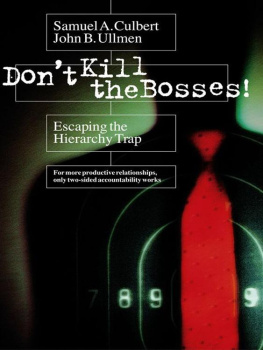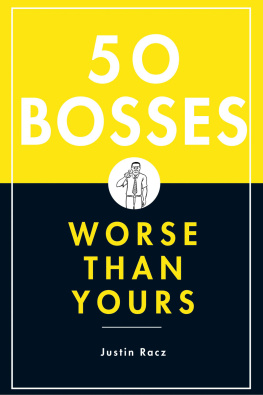Praise for Dont Kill the Bosses!
Dont Kill the Bosses! offers a valuable new approach to management philosophy. It makes one rethink traditional boss/employee relationships.
Glenda Grant, President, Hearst Entertainment
When issuing directives and asserting myself Ive always tried to think about the other persons knowledge and experience. This book has provided additional sensitivitymost essentially, the importance of hiring people who know more than you and the structure that allows them to excel.
Paul Koplin, President, Venture Technologies Group, LLC
Dont Kill the Bosses! reveals a practical, sensible and inherently intuitive paradigm for the management of hierarchical relationships. Its an easy read, well salted with real-life case studies, communicating a clear message to anyone who reports to someone or has someone reporting to them.
Gordon W. Perkin, M.D., Director, Global Health Program, Bill and Melinda Gates Foundation
You will learn in this book that two-sided accountability leads to straight talk and better communications. Finally, a book with practical advice that managers can use day-to-day to get better results.
Philip J. Harkins, President and CEO, Linkage Inc.
What the authors call the obvious is a refreshing awareness of dealing with relationships both inside and outside the workplace. Two-sided accountability is the foundation for any successful organization, however, until now, there never has been such an insightful review of the concept. In short, this is an unforgettable book.
Donald L. Struminger, Chairman of the Board, Virginia Linen Service
Dont Kill
the Bosses!
Dont Kill the Bosses!
Escaping the Hierarchy Trap
Samuel A. Culbert
John B. Ullmen
BERRETT-KOEHLER PUBLISHRS, INC.
San Francisco
Dont Kill the Bosses
Copyright 2001 by Samuel A. Culbert
All rights reserved. No part of this publication may be reproduced, distributed, or transmitted in any form or by any means, including photocopying, recording, or other electronic or mechanical methods, without the prior written permission of the publisher, except in the case of brief quotations embodied in critical reviews and certain other noncommercial uses permitted by copyright law. For permission requests, write to the publisher, addressed Attention: Permissions Coordinator, at the address below.
Berrett-Koehler Publishers, Inc.
235 Montgomery Street, Suite 650
San Francisco, California 94104-2916
Tel: (415) 288-0260, Fax: (415) 362-2512
www.bkconnection.com
Ordering information for print editions
Quantity sales. Special discounts are available on quantity purchases by corporations, associations, and others. For details, contact the Special Sales Department at the Berrett-Koehler address above.
Individual sales. Berrett-Koehler publications are available through most bookstores. They can also be ordered directly from Berrett-Koehler: Tel: (800) 929-2929; Fax: (802) 864-7626; www.bkconnection.com
Orders for college textbook/course adoption use. Please contact Berrett-Koehler: Tel: (800) 929-2929; Fax: (802) 864-7626.
Orders by U.S. trade bookstores and wholesalers. Please contact Ingram Publisher Services, Tel: (800) 509-4887; Fax: (800) 838-1149; E-mail: customer.service@ingram publisherservices.com; or visit www.ingrampublisherservices.com/Ordering for details about electronic ordering.
Berrett-Koehler and the BK logo are registered trademarks of Berrett-Koehler Publishers, Inc.
First Edition
Hardcover print edition ISBN 978-1-57675-161-9
PDF e-book ISBN 978-1-60509-806-7
IDPF ISBN 978-1-60994-336-3
2010-1
Production Management. Michael Bass & Associates
Cover design: MvB Design
Rosella
Preface
W hen it comes to thinking about difficult situations you face at work, interactions between you and your boss or between you and your direct reports probably rank amongst the most challenging. If youre like most of us, any difficulty can seem like Friday the 13th and Nightmare on Elm Street rolled up into one long movie that goes on and on without ending. We know about this because were in the business of helping people solve the work situations they find most troubling. Even bosses who complacently reason that the absence of smoke means no fire eventually discover what this apparent serenity has cost their company. And in almost every instance, their subordinates knew well in advance about the problem but felt at peril to send out so much as a single smoke signal.
Had we done a double-blind study, we couldnt be more convinced of our belief that boss/subordinate relationships constitute the number one selling agent for tranquilizers, antacids, and beta-blockers and probably account for more people losing their jobs than market downturns and personal incompetence. Even people who dont have a problem today will tell you about a terrible relationship they had with a boss or subordinate in the past. They will candidly admit to not feeling out of the woods when it comes to thinking about tomorrow. And were not just talking about bosses and subordinates; were talking about all unequal power relationships such as those between buyers and suppliers and big and small company joint ventures and partnerships. In todays work world, few know how to deal fairly and constructively with a hierarchical relationship in which one party feels entitled to dominate. This kind of relationship poses a continuing threat to your everyday effectiveness and productivity. Like most people, you probably know of few solutions other than fault-finding divorce and resource-defeating breakup. This book gives you a new and far more constructive remedy.
We propose a scheme for humanizing boss/subordinate relationships. We want to make it possible for you to get the troubling issues out on the table where they can be forthrightly engaged. Its a scheme that cuts to the heart of whats wrong in even the most successfully run organizations and companies. We dislike the subordinate treatment that most people receive from their boss, but no more than we dislike the superior treatment most bosses receive from the people reporting to them, as bosses and subordinates alike confuse such operational basics as responsibility, authority, and accountability. We know theres confusion; otherwise, boss-dominated relationships would not be the default setting behind most managerial interactions.
Boss-dominated relationships! What a strange and nonsensical state of affairs. After all thats been said about the advantages of empowerment, participatory decision making, and team play, how is it possible that we continue allowing bosses to dominate and subordinates to fake acquiescence to the extent that both do today? Its a particularly ludicrous situation when you consider the proliferation of new organization effectiveness models put forth in contemporary management books. In fact every effectiveness scheme weve seen prescribes straightforward boss/subordinate communications, the type that inspires mutual confidence. Some go so far as to propose Sunday school lists for achieving honest, give-and-take interactions that have created more book sales than real-time improvements. None alludes to positives in getting subordinates to knuckle under, view situations as the boss sees them, and generally to do what they are toldconditions rife in todays workplace.












